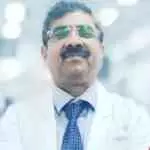- Home
- Medical news & Guidelines
- Anesthesiology
- Cardiology and CTVS
- Critical Care
- Dentistry
- Dermatology
- Diabetes and Endocrinology
- ENT
- Gastroenterology
- Medicine
- Nephrology
- Neurology
- Obstretics-Gynaecology
- Oncology
- Ophthalmology
- Orthopaedics
- Pediatrics-Neonatology
- Psychiatry
- Pulmonology
- Radiology
- Surgery
- Urology
- Laboratory Medicine
- Diet
- Nursing
- Paramedical
- Physiotherapy
- Health news
- Fact Check
- Bone Health Fact Check
- Brain Health Fact Check
- Cancer Related Fact Check
- Child Care Fact Check
- Dental and oral health fact check
- Diabetes and metabolic health fact check
- Diet and Nutrition Fact Check
- Eye and ENT Care Fact Check
- Fitness fact check
- Gut health fact check
- Heart health fact check
- Kidney health fact check
- Medical education fact check
- Men's health fact check
- Respiratory fact check
- Skin and hair care fact check
- Vaccine and Immunization fact check
- Women's health fact check
- AYUSH
- State News
- Andaman and Nicobar Islands
- Andhra Pradesh
- Arunachal Pradesh
- Assam
- Bihar
- Chandigarh
- Chattisgarh
- Dadra and Nagar Haveli
- Daman and Diu
- Delhi
- Goa
- Gujarat
- Haryana
- Himachal Pradesh
- Jammu & Kashmir
- Jharkhand
- Karnataka
- Kerala
- Ladakh
- Lakshadweep
- Madhya Pradesh
- Maharashtra
- Manipur
- Meghalaya
- Mizoram
- Nagaland
- Odisha
- Puducherry
- Punjab
- Rajasthan
- Sikkim
- Tamil Nadu
- Telangana
- Tripura
- Uttar Pradesh
- Uttrakhand
- West Bengal
- Medical Education
- Industry
Rare Disease Show Episode 19: Decoding Pulmonary Arterial Hypertension with Dr Brajesh Kumar Mishra - Video
|
Overview
Medical Dialogues presents a rare disease series, delving into the realm of uncommon medical conditions. Rare diseases are medical conditions that affect only a small percentage of the population. Throughout this series, we'll discuss these rare diseases in various episodes, with medical experts providing clear explanations and insights.
Rare Disease Show Episode 19-- In today's show we will cover Pulmonary Arterial Hypertension.
Pulmonary Arterial Hypertension (PAH) is a rare but serious condition characterized by high blood pressure in the arteries that supply blood to the lungs.
This increased pressure strains the heart, specifically the right ventricle, as it works harder to pump blood through narrowed arteries. Over time, PAH can lead to symptoms such as shortness of breath, fatigue, chest pain, and, in advanced cases, right-sided heart failure.
Causes include genetic factors, connective tissue diseases, congenital heart defects, or it can be idiopathic. Treatment focuses on reducing symptoms, improving quality of life, and slowing disease progression through medications, oxygen therapy, or, in severe cases, surgery.
In this episode, Dr Brajesh Kumar Mishra, a cardiologist at Manipal Hospital, Gurgaon shares his insights by addressing questions asked by the Medical Dialogues team-
1. Can you explain what Pulmonary Arterial Hypertension (PAH) is and why is this a rare disease?
2. What are the primary causes or risk factors for PAH? Are there any emerging causes that we should be aware of?
3. How common is PAH, and who is most at risk for developing this condition?
4. What are the early symptoms of PAH, and how can patients differentiate them from other heart or lung conditions?
5. How is PAH diagnosed? What tests or procedures are typically used to confirm a diagnosis?
6. Can you describe the underlying pathophysiological mechanisms of PAH and how they lead to the development of symptoms?
7. What are the current mainstays of treatment for PAH, and how do they work to alleviate symptoms or slow disease progression?
8. Can you explain the role of pulmonary vasodilators in treating PAH?
9. What new or emerging therapies are showing promise in the treatment of PAH, and how do they compare to existing options?
10. What are the biggest challenges in managing PAH, both from a clinical and a patient perspective?
11. What are some of the most promising areas of research in PAH treatment? Are there any recent breakthroughs you find particularly exciting?
12. What do you think is the most critical factor in improving outcomes for patients with PAH?
Speakers
Dr. Nandita Mohan is a practicing pediatric dentist with more than 5 years of clinical work experience. Along with this, she is equally interested in keeping herself up to date about the latest developments in the field of medicine and dentistry which is the driving force for her to be in association with Medical Dialogues. She also has her name attached with many publications; both national and international. She has pursued her BDS from Rajiv Gandhi University of Health Sciences, Bangalore and later went to enter her dream specialty (MDS) in the Department of Pedodontics and Preventive Dentistry from Pt. B.D. Sharma University of Health Sciences. Through all the years of experience, her core interest in learning something new has never stopped. She can be contacted at editorial@medicaldialogues.in. Contact no. 011-43720751
Dr Brajesh Kumar Mishra (MBBS, MD (Medicine), DNB (Cardiology), Cardiac EP Fellowship, Observership Mount Sinai) is an Interventional Cardiologist, and Cardiac Electrophysiologist at Manipal Hospital, Gurugram. He has 24 years of experience in Cardiology and worked as an expert in different cities in India. Dr. Brajesh Kumar Mishra has contributed to handling numerous complex medical cases in several hospitals. He is known for his attention to accurate diagnosis and for treating patients empathetically. The speciality interests of Dr Brajesh are procedures like Radial Procedures, ICD and CRTD Pacemakers, Interventional Cardiology, Cardiac Electrophysiology, etc. He is an active member of the Indian Medical Association (IMA) and the Indian Heart Rhythm Society (IHRS).




